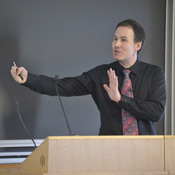Professor of Biology, UTSC
http://www.utsc.utoronto.ca/~herbertk/
Biography
 Prof. Kronzucker is the founder and Director of the Canadian Centre for World Hunger Research (CCWHR). He is renowned for his seminal contributions to the physiology and ecology of nutrient acquisition by plants. He holds degrees from the University of Würzburg, Germany, and the University of British Columbia, Vancouver. From 1995-1998, he worked as a Rockefeller ‘Human Frontier’ Fellow at the International Rice Research Institute (IRRI), Philippines, was appointed to professorships at the University of Western Ontario in 1998 and the University of Toronto in 2001, and has been Full Professor in the Department of Biological Sciences at the University of Toronto at Scarborough (UTSC) since 2007. He held the Canada Research Chair in Systems Biology of Plant Nutrition and Ion Transport from 2005 to 2015, and was recently named Distinguished Professor by the University of Toronto. He has authored over 100 articles and book chapters, and has served in a large number of administrative, editorial, and scientific advisory capacities, including for NSERC, the BBSRC, and the Bill & Melinda Gates Foundation. In 2014, he was appointed editor-in-chief for the Journal of Plant Physiology, one of the oldest and most established international journals in his field. Kronzucker’s work has been prolifically featured in the popular press, including The New York Times, The Globe and Mail, and Toronto Life Magazine. He is the recipient of many awards, including a UTSC Principal’s Research Award and a Bayer ‘Science for a Better Life’ Award, which recognizes Canadians who have made a mark on society through science and innovation.
Prof. Kronzucker is the founder and Director of the Canadian Centre for World Hunger Research (CCWHR). He is renowned for his seminal contributions to the physiology and ecology of nutrient acquisition by plants. He holds degrees from the University of Würzburg, Germany, and the University of British Columbia, Vancouver. From 1995-1998, he worked as a Rockefeller ‘Human Frontier’ Fellow at the International Rice Research Institute (IRRI), Philippines, was appointed to professorships at the University of Western Ontario in 1998 and the University of Toronto in 2001, and has been Full Professor in the Department of Biological Sciences at the University of Toronto at Scarborough (UTSC) since 2007. He held the Canada Research Chair in Systems Biology of Plant Nutrition and Ion Transport from 2005 to 2015, and was recently named Distinguished Professor by the University of Toronto. He has authored over 100 articles and book chapters, and has served in a large number of administrative, editorial, and scientific advisory capacities, including for NSERC, the BBSRC, and the Bill & Melinda Gates Foundation. In 2014, he was appointed editor-in-chief for the Journal of Plant Physiology, one of the oldest and most established international journals in his field. Kronzucker’s work has been prolifically featured in the popular press, including The New York Times, The Globe and Mail, and Toronto Life Magazine. He is the recipient of many awards, including a UTSC Principal’s Research Award and a Bayer ‘Science for a Better Life’ Award, which recognizes Canadians who have made a mark on society through science and innovation.
Research Statement
Declining soil fertility, increasing soil salinization, and a burgeoning human population have led to severe strains on the world’s agricultural systems. A key factor in the relief from such strains is the better understanding of plant responses to soil nutrients and toxicants, and the application of this understanding to the improvement of cultivars and farming practices. Our laboratory seeks to directly engage in this urgent mission, by use of a combination of physiological approaches designed to address questions of nutrient acquisition and stress tolerance at cellular and whole-plant levels, in the world’s most important plant species.
We examine the role of nutrient ion fluxes at cellular, whole-organism, and ecosystem levels, focusing on cellular ionic interactions, drought and salt stresses, and yield potential in cereals. Our approach is multidisciplinary, ranging from mathematical modelling to radiotracing of ion fluxes and ecological analyses in the field. The techniques we use include the subcellular tracing of ion fluxes and compartmentation, genetic analysis of plant metabolism and nutrient acquisition, electrophysiology, gas exchange, ionic and metabolic profiling of tissues, and analyses of plant growth and yield. We strive to investigate the physiology of intact model and non-model organisms, and develop methods to tackle the complexity associated with whole systems.